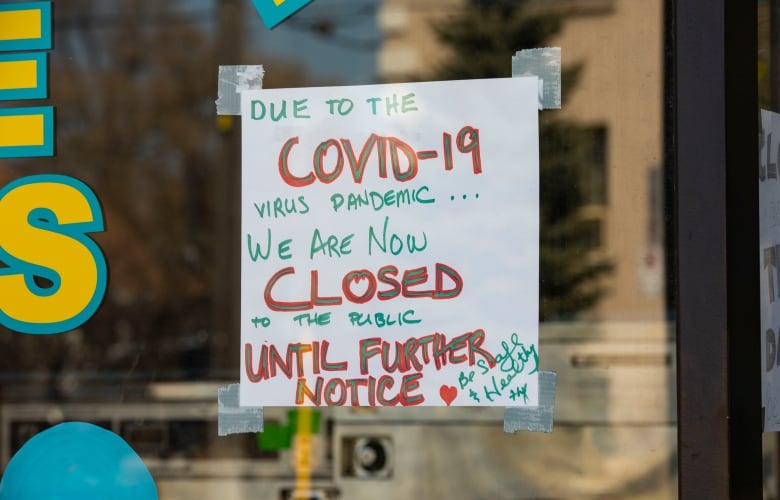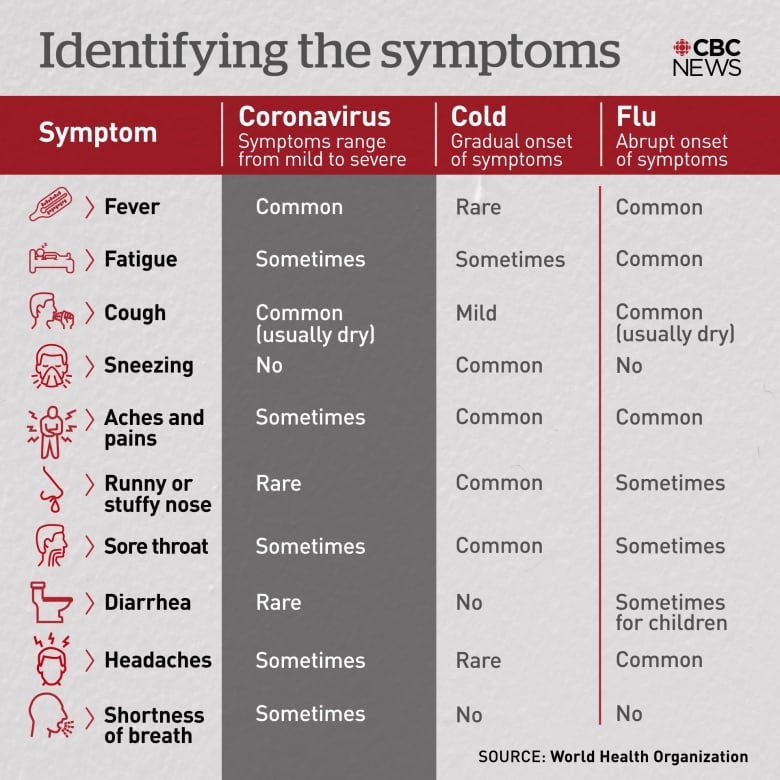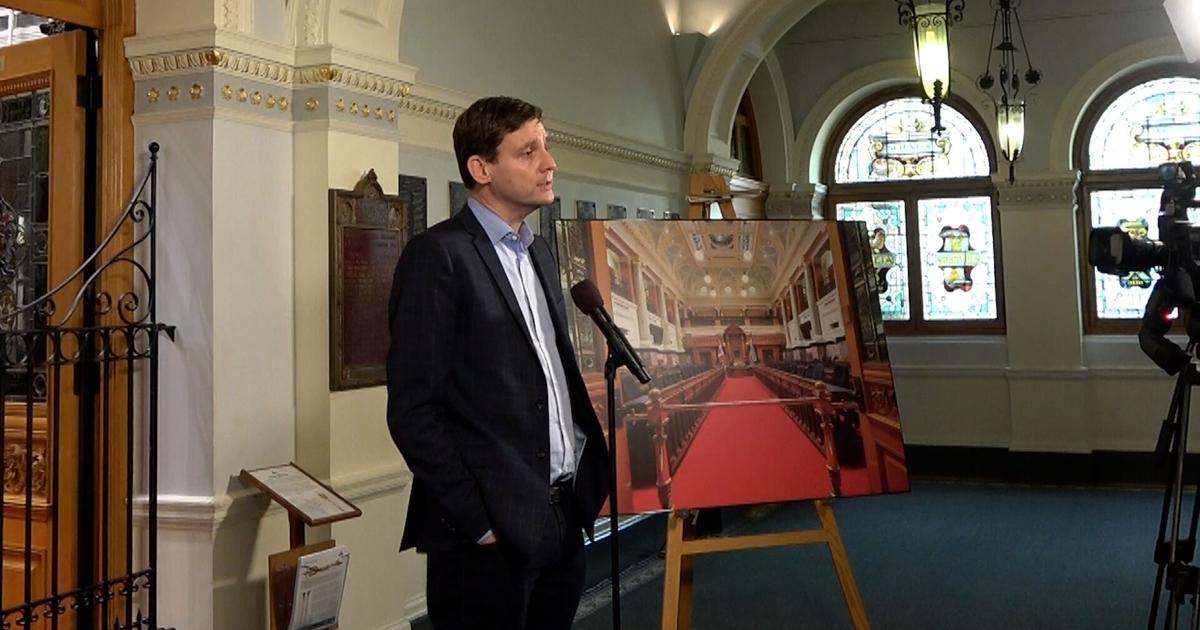News
Coronavirus: What's happening in Canada and around the world on Saturday – CBC.ca

The latest:
The Chinese city of Wuhan — where the novel coronavirus outbreak first emerged late last year — began lifting a two-month lockdown on Saturday, as the number of cases of the infection worldwide approached 600,000.
Wuhan restarted some subway services and reopened borders, allowing some semblance of normality to return and families to reunite.
Authorities had taken strict measures to stop people from entering or leaving the industrial city of 11 million people in central China. Families were confined to their homes. Bus and taxi services were shut, and only essential stores were allowed to remain open.
China’s National Health Commission said on Saturday that 54 new coronavirus cases were reported on the mainland on Friday, all involving so-called imported cases. Mainland China now has 81,394 cases, with the death toll rising by three to 3,295, the commission said. China closed its national borders to most foreigners two days ago amid fears of a second wave of infections.
In New York City, considered the epicentre of the outbreak in the U.S. with more than a third of the country’s cases, the Javits Convention Centre has been turned into a temporary hospital and will start treating patients on Monday.
New York Gov. Andrew Cuomo says he wants four more temporary hospitals set up to meet the growing number of coronavirus cases. New York state has seen the highest number of COVID-19 deaths in the U.S., more than 500. There are about 1,600 people in intensive care. Cuomo says state hospitals need 30,000 more ventilators.
Across the U.S., there have been about 1,600 deaths from the virus out of 100,040 cases reported as of Friday, a number that surpasses the count in China.
Dr. Howard Njoo, Canada’s deputy chief public health officer, says the fight against the pandemic is far from over and that it could include a second wave. His comments on Friday come as the number of cases in Canada surged to 4,757, including 55 deaths. Quebec’s COVID-19 caseload has soared to more than 2,000, more than double Ontario’s 993 cases.
More than a dozen Canadian flight attendants are sick with COVID-19, with one recently released from an intensive care unit in Calgary, CBC News has learned. Seven WestJet employees and five at Air Transat are also confirmed cases. The flight attendants’ union at Air Canada is calling for full protective suits for all air crews. This past week in the U.S., a flight attendant with American Airlines died after contracting the virus.
WATCH | Infected Canadian flight attendants speak out:
At sea, four passengers have died aboard a cruise ship now anchored off the coast of Panama and two people aboard the ship have tested positive for the novel coronavirus, the cruise line said Friday, with hundreds of passengers unsure how long they will remain at sea.
Global Affairs Canada says it is aware of 248 Canadians on the ship — 247 passengers and one crew member.
Holland America Line confirmed Canadians are not among the four dead.
Holland America Line said in a post on its Facebook page that more than 130 people aboard the Zaandam had reported flu-like symptoms.
Prime Minister Justin Trudeau said Friday there are many projections around how the COVID-19 crisis will unfold — but those projections all “hinge on choices” Canadians have made in the past few days and will make in the days ahead.
WATCH | Trudeau says severity of the COVID-19 pandemic depends on Canadians’ actions:
“We know we’re talking about weeks and possibly months,” Trudeau said. “But I am very optimistic that we’re going to get through this in the right way, because Canadians do what they need to do to be there for each other and to keep us all safe.”
He said the government, which had previously announced a temporary 10-per-cent wage subsidy, will boost that to 75 per cent for qualifying businesses — a move many in the business world, as well as labour groups and opposition politicians, had called for.
“We’re helping companies keep people on the payroll so that workers are supported and the economy is positioned to recover from this,” Trudeau said.
The prime minister said the subsidy for small- and medium-sized businesses would be backdated to mid-March. More details about the plan for small businesses, including a loan program, will be released in the coming days, he said.
WATCH / Dr. Howard Njoo says Canada’s fight against COVID-19 could last many months:
Also Friday, the Bank of Canada made an unscheduled announcement, dropping its benchmark rate by 50 basis points to 0.25 per cent in an effort to support an economy hit hard by the outbreak.
Bank of Canada governor Stephen Poloz said the whole world is being impacted by the COVID-19 shock, but said some economies are being affected also by the oil price competition between Russia and Saudi Arabia. That means the Canadian economy has two shocks to deal with, he said.
Here’s what’s happening in Canada’s provinces and territories
In British Columbia, people who ignore COVID-19 public health orders face a fine of up to $25,000. The province has also banned reselling essential supplies, including cleaning materials and personal protective equipment. Read more about what’s happening in B.C., including a note of cautious optimism from health officials who said Friday that physical distancing restrictions are succeeding.
Alberta announced the immediate closure of all non-essential businesses Friday, including close-contact businesses such as hair salons and barber shops, tattoo and piercing studios and esthetic services, and limited public gatherings to 15 people or fewer. Read more about what’s happening in Alberta, including a story from Edmonton about a laptop drive aiming to connect marginalized people during the coronavirus pandemic.

Saskatchewan is releasing more information about COVID-19 cases in the province, including information on residents who have recovered after testing positive. The province, which has reported 95 cases, lists three cases as recovered. Read more about what’s happening in Saskatchewan, which announced a new appointment-only testing site in Regina.
Manitoba is expanding its COVID-19 testing to include symptomatic health workers, people who live in group care settings (including long-term care and remote work camps), inmates and more. Chief provincial public health officer Dr. Brent Roussin also said all people living on First Nations in the province who are experiencing respiratory symptoms will be tested. Read more about what’s happening in Manitoba, which recorded its first death on Friday.
An infectious disease specialist in Toronto is warning that “it’s almost inevitable” that hospitals in Ontario are going to see a surge in COVID-19 cases. Dr. Andrew Morris says it’s not yet clear exactly when it will happen but said the best estimates suggest clinicians will “start seeing a rise in the next week or so,” and will see cases continue to increase for weeks, if not months. Read more about what’s happening in Ontario, where one city has set up a new snitch line for reporting physical-distancing violations.
WATCH | WW II veteran dies from COVID-19, family unable to say goodbye:
In Quebec, Premier François Legault is urging anyone who is in a position to help to volunteer at places like food banks, which are seeing an increase in demand. And Montreal declared a local state of emergency over fears of a COVID-19 outbreak among the city’s homeless. Read more about what’s happening in Quebec, including the story of a nurse working at one of Montreal’s testing sites.
WATCH: Drone video of Montreal shows once-bustling public spaces nearly empty
New Brunswick’s premier says between 25,000 and 30,000 people in the province have already lost their jobs in the COVID-19 pandemic. “We are facing a situation unlike we have ever experienced before,” Blaine Higgs said Thursday. Read more about what’s happening in New Brunswick, including an effort to connect laid-off workers with food manufacturers struggling to keep up with demand.
In Nova Scotia, the head of the province’s telephone health service says anyone who gets a referral will get a COVID-19 test. Dr. Todd Howlett, medical director of 811, said the service is adapting to meet the demand created by the outbreak. Read more about what’s happening in Nova Scotia.
Prince Edward Island has reported a total of nine cases of COVID-19, including at least one who has recovered. Read more about what’s happening on P.E.I.

In Newfoundland and Labrador, the health minister says the province’s public health emergency could last months. “I am pretty sure that it’s going to be some time in June,” John Haggie said. “Whether or not we make a Canada Day celebration, time will tell.” Read more about what’s happening in N.L.
Yukon’s government is banning residential evictions during the COVID-19 pandemic. Air North, meanwhile, is laying off more than half of its workers and reducing service because of the outbreak. Read more about what’s happening across Canada’s North.
Here’s what’s happening in the United States
From Reuters, updated at 5:00 a.m. ET
U.S. doctors and nurses on the front lines of the coronavirus outbreak came under increasing stress on Friday as the number of cases skyrocketed and hospital staff were forced to ration care for an overwhelming number of patients, a day after the U.S. surpassed a grim milestone, becoming the country with the highest number of infections in the world.
One emergency room doctor in Michigan said he was using a single paper face mask for an entire shift due to a shortage and that his hospital would soon run out of ventilators, the machines needed by sufferers of COVID-19, the respiratory disease caused by the virus, to help them breathe.
After claiming on Thursday that he believed the numbers of ventilators being requested by states were sometimes exaggerated, U.S. President Donald Trump promised an announcement later Friday on the purchase of additional ones.
On Friday, Trump signed a sweeping $2.2-trillion relief bill into law, only hours after it had been approved by the House of Representatives, after having been passed by the Senate earlier this week.
He also invoked emergency powers to require General Motors Co. to build much-needed ventilators after he accused the largest U.S. automaker of “wasting time” during negotiations.
WATCH | Dr. Howard Njoo talks about staying ‘in your bubble’:
Here’s what’s happening in Europe
From Reuters and The Associated Press, updated at 5:30 a.m. ET
Italy on Friday registered the most deaths since the country’s outbreak exploded five weeks earlier, adding 969 more victims to raise the world’s highest COVID-19 toll to 9,134. Lombardy accounted for 541 of them.
Italy also surpassed China in total confirmed cases, and stands behind only the United States. But the National Institutes of Health also said there had been a slowing of infections in recent days, suggesting that a national lockdown was starting to show an effect after 2½ weeks.
WATCH | Trump orders GM to make ventilators:
France is extending its nationwide confinement measures another two weeks past the original end date of Tuesday, until April 15. Saying “we are only at the beginning” of the virus wave, Prime Minister Edouard Philippe announced the extension Friday. The move comes after the head of the French Hospital Federation said hospitals in and around Paris will be swamped within 48 hours, with the peak not expected until April. France has reported nearly 1,700 deaths, the fifth-highest number of any country worldwide, including a 16-year-old schoolgirl from the Essonne region, the youngest person in the country to die from COVID-19.
Spain’s coronavirus death toll rose overnight by 769 cases to 4,858, the health ministry said on Friday, a new record in the number of fatalities recorded in 24 hours. The total number of those infected rose by more than 7,800 on Friday to 64,059.

Ireland on Friday ordered a lockdown until April 12, with Prime Minister Leo Varadkar telling citizens to leave home only for grocery shopping, brief exercise or essential family visits. Travel more than two kilometres from home is banned, while all those over 70 are being instructed to “cocoon.”
“I’m appealing to every man, woman and child to make these sacrifices for the love of each other … Show that you care for your family and friends: Stay home,” Varadkar told a news conference.
In Germany, the number of confirmed cases has risen to 48,582 and 325 people have died of the disease, statistics from the Robert Koch Institute for infectious diseases showed on Saturday.

Poland has temporarily closed its borders to thousands of cross-border workers. The measures take effect Friday and require cross-border workers to stay on one side of the border until April 11, just before Easter. Except for trucks and trains carrying goods, anyone crossing into Poland will be put on 14-day quarantine. The country has confirmed 1,244 cases of infection and 16 people have died.
In southern Finland, police are preparing to enforce the new regulation aimed at ceasing all unnecessary human traffic to and from Uusimaa, the region that includes the capital, Helsinki, according to Social Affairs Minister Krista Kiuru. The Nordic country has so far confirmed 958 coronavirus cases — the vast majority of them in Uusimaa — and five deaths. The exceptional move, which is set to end April 19, affects the daily lives of some 1.7 million people, nearly a third of Finland’s population.
Switzerland’s infections topped 11,800 as the government pumped money into the economy and army medical units helped hospitals. Swiss authorities are lighting up one of their most famed landmarks, the Matterhorn, to show solidarity in the fight against the coronavirus.
Here’s a look at what’s happening in some other parts of the world
Forty-six passengers onboard the German cruise ship Artania have been reported as showing COVID-19 symptoms, according to Western Australia Premier Mark McGowan on Saturday. The Artania was allowed to pull into in Fremantle, Western Australia on Thursday and sick passengers were taken off to be treated in Perth on Friday. The state government had initially not wanted the ship to dock and tried to divert it to a military base. There are more than 800 people onboard the vessel.
Turkey halted all intercity trains and limited domestic flights on Saturday, as the number of coronavirus cases jumped by a third in a day to 5,698, with 92 dead.
Iran has confirmed another 144 deaths from the coronavirus and says thousands more are in critical condition as the military completed work on a 2,000-bed field hospital in an exhibition centre in the capital. Iran has reported nearly 2,400 deaths among more than 32,000 cases.
Iranian officials have repeatedly insisted they have the outbreak under control, despite concerns it could overwhelm the country’s health facilities. Authorities have urged people to stay home but have not imposed the sweeping lockdowns seen elsewhere in the region.

Brazil’s President Jair Bolsonaro has taken the view that protecting the country’s economy takes priority over physical distancing measures.
“I’m sorry, some people will die, they will die, that’s life,” Bolsonaro said in a television interview on Friday night. “You can’t stop a car factory because of traffic deaths.”
He accused some of Brazil’s 26 governors of playing “a numbers game to favour political interests” in their reporting of cases and said the death toll from COVID-19 in the state of Sao Paulo seemed “too large” at 68 out of 1,223 cases.
South Korea said it will block any passenger with even a mild fever from entering the country starting next week to counter a rise in coronavirus cases linked to arrivals from abroad. Health Ministry official Koh Deuk-young on Friday said all airlines flying to South Korea from Monday will be required to screen passengers for fevers and deny boarding to anyone with a temperature higher than 37.5 C. Koh said airlines will refund tickets for those who are denied flights.
South Korea in past weeks has been scrambling to strengthen border controls, including enforcing two-week quarantines on South Korean nationals and foreigners with long-term stay visas arriving from the United States and Europe amid broadening outbreaks in the West.

Chinese leader Xi Jinping has told U.S. President Donald Trump that China “understands the United States’s current predicament over the COVID-19 outbreak and stands ready to provide support within its capacity.” The official Xinhua News Agency said Xi delivered the message in a call to Trump on Friday, in which he also urged the U.S. to “take substantive action in improving bilateral relations.”
In the phone call, Xi “suggested that the two sides work together to boost co-operation in epidemic control and other fields, and develop a relationship of non-conflict, non-confrontation, mutual respect and win-win co-operation,” the official Xinhua News Agency reported. The virus outbreak was first reported in China in December and now appears to have peaked in the country, even while the government remains on guard against imported cases.
South Africa has announced its first two deaths from the coronavirus as the country’s cases rose above 1,000. The health minister said in a statement that the deaths occurred in Western Cape province. South Africa has the most cases in Africa and as of midnight entered a three-week lockdown. The military is in the streets helping to enforce measures that include bans on alcohol sales. Concerns are high about water supply in crowded, low-income townships.

Mexico reported 717 cases and 12 deaths as of Friday night. President Andres Manuel Lopez Obrador has been criticized for not taking the epidemic seriously enough, but in recent days has made more of an effort to urge Mexicans to stay at home and be aware of the symptoms. On Friday, he announced 17 military-operated hospitals that will increase the number of intensive care beds are nearing completion.
Indonesia’s coronavirus cases surpassed 1,000 in the biggest one-day jump as the government ordered mass testing across the country to contain the disease’s spread. The government on Friday confirmed 153 new COVID-19 cases, with 87 deaths. Indonesia has planned to distribute about a half million test kits across the archipelago nation, which is home for 270 million people.
News
Toronto Sceptres open camp ahead of second PWHL season |

The Toronto Sceptres have opened training camp for the upcoming PWHL season, with a new logo, new colours, new jerseys and a new primary venue in Coca-Cola Coliseum. The team has a lot to look ahead to after a busy off-season and successful inaugural campaign. (Nov. 12, 2024)
News
Major shakeup at Canada Soccer in wake of drone-spying scandal |

After a lengthy independent report on the Summer Olympic drone-spying scandal, Canada Soccer says women’s head coach Bev Priestman, assistant coach Jasmine Mander and analyst Joey Lombardi will not be back with the organization. It found the “practice of conducting surreptitious surveillance of opponents” predated this summer’s Paris Olympics. Former coach John Herdman has yet to give evidence. (Nov. 12, 2024)
News
Eby pays tribute to former B.C. premier John Horgan |

B.C. Premier David Eby says John Horgan was an inspirational leader who guided the province’s New Democrats out of the political wilderness after 16 years in Opposition. Eby says his predecessor as premier, who has died after a third bout with cancer, was known for his compassion for people from all walks of life but also his sharp tongue. (Nov. 12, 2024)
-

 News22 hours ago
News22 hours agoAs Toronto enters its Taylor Swift era, experts say crowd safety depends on planning
-

 News22 hours ago
News22 hours agoCanadanewsmedia news November 12, 2024: Union serves strike notice to Canada Post
-

 News22 hours ago
News22 hours agoFormer CFL commissioner Mark Cohon joins Northern Super League as board chair
-

 News22 hours ago
News22 hours agoWaymo’s robotaxis now open to anyone who wants a driverless ride in Los Angeles
-

 News22 hours ago
News22 hours agoFederal government moves to end port strikes, orders binding arbitration
-

 News22 hours ago
News22 hours agoToronto play ‘The Bidding War’ taps into city’s real estate anxiety
-

 Business22 hours ago
Business22 hours agoTrump campaign promises unlikely to harm entrepreneurship: Shopify CFO
-

 News22 hours ago
News22 hours agoWorld’s largest active volcano Mauna Loa showed telltale warning signs before erupting in 2022































